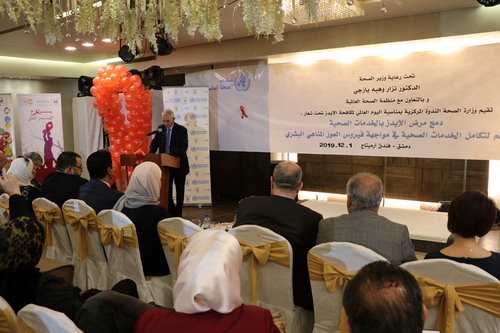“40 years ago, there was limited knowledge about the transmission of HIV, and those affected lacked proper treatment. Today, with the advancement of science and better understanding of the risk factors, prevention, and availability of effective treatment, there is no reason for people living with HIV to perpetually suffer from stigma. Raising awareness about unsafe blood transfusions, transmission, voluntary confidential testing and adherence to treatment is essential,” said Dr Nima Abid, WHO Representative a.i. in the Syrian Arab Republic.
The country is considered to have one of the lowest prevalences of HIV infection in the Region, with less than 2 per 100,000 among the general population affected and less than 1% among the most at-risk populations in 2018. The total number of total reported HIV cases until the end of the third quarter of 2019 was 1013.
However, the current crisis in the country has significantly affected the health system, and there is a need to improve the disease surveillance system and behavioural risk surveillance to be able to accurately estimate HIV prevalence. In addition, health services for the treatment of HIV should be provided at the primary and secondary levels of health care.
WHO is supporting the Ministry of Health’s efforts to expand HIV surveillance and screening activities, and to introduce viable measures, not only to control the spread of HIV, but also to treat patients. WHO’s support for HIV surveillance and screening is just one of a number of joint WHO/Ministry of Health activities to combat AIDS and curb its spread in the country.
In 2019, thanks to a generous donation from the Global Fund to Fight AIDS, Tuberculosis and Malaria, WHO provided the national AIDS control programme with laboratory equipment and accessories, including sufficient supplies to test more than 65,000 patients, and essential medicines. WHO is also supporting capacity-building efforts by training laboratory technicians in state-of-the-art methods for the early diagnosis of HIV/AIDS, and training staff from the national AIDS control programme on new treatment protocols and management capacities. WHO is also supporting the provision of counselling and rapid testing services through Ministry of Health counselling centres in most governorates.
“On World AIDS Day, we call on all health partners to work together to improve access to health care for patients with HIV, and all people in need of health care services,” said Dr Abid.
“Only by working together we can stop the rise in new HIV infections and reduce the number of deaths,” he added.









